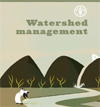Key facts
 The important role women play in forestry is well recognized internationally. Yet, the full contributions of women have not been realized.
The important role women play in forestry is well recognized internationally. Yet, the full contributions of women have not been realized.
Although the policy environment for addressing gender inequality has improved over the past decade, women continue to be disadvantaged by insecure property rights and limited access to forest, trees and land resources. They also suffer from discrimination and bias in the provision of services, including credit and technology, and are often excluded from decision-making at household, community and national levels.
Gender mainstreaming continues to be an on-going initiative in Forestry’s work to help countries overcome challenges in achieving gender equality.
Empowering women in the forestry sector can create significant development opportunities and generate important additional benefits for their households and communities, particularly in rural areas. Given their knowledge and roles of forests and the forestry sector, women need to be sufficiently represented in relevant institutions, accepted as stakeholders with specific views and interests, and empowered to have a say in transformative decisions. In order to empower women in the forestry sector it is necessary to: advocate for good governance systems which provide secure tenure for women; collect gender disaggregated data to monitor gender roles in the sector; implement gender in capacity building activities; carry out knowledge building activities aimed at understanding gender-specific roles, needs and dynamics; analyse the potential entry points for gender components in projects and programmes; and circulate important data and facts related to gender in the forests and forestry sector.
The FAO Forestry Division (NFO) ensures that gender issues are taken into account in the design, budgeting, planning, implementation and monitoring processes of all programmes and projects of the division. The Division also promotes and implements approaches and interventions for capacity development and women’s empowerment, including through trainings on gender mainstreaming in forest-related programmes and projects and ensuring that comparative sex-disaggregated data are produced and documented. At policy and strategic level, the Forestry Division works closely with governments and line ministries to support policymakers in their efforts to review and strengthen laws and legal frameworks in the forest sector to be more gender-responsive. Finally, the Forest Division ensures that women and men’s roles, contributions, needs and responsibilities in the forest sector are well reflected, documented and disseminated in knowledge and communication products.
Case studies
 Watershed Management Watershed Management |  Participatory Forestry Participatory Forestry |  Community-Based Forest Development Community-Based Forest Development |  The Gender Dimension of the Finland-FAO Forestry Program The Gender Dimension of the Finland-FAO Forestry Program |
